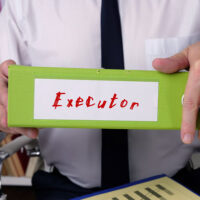Steps To Take After Being Appointed Executor

Being appointed the executor of another person’s estate is a big responsibility. An executor is the person appointed by a decedent in their last will and testament. The role of the executor is to oversee the estate as it moves through the probate process. The purpose of probate is to identify the decedent’s assets, value them, and transfer them to new owners. Before this happens, creditors can also file claims against the estate, and state, federal, gift, and estate taxes must be paid.
Some people are honored to be appointed the executor of another person’s estate, but the role does come with responsibility. To ensure things proceed as smoothly as possible, you should follow the steps below after learning you have been named executor.
Locate Estate Planning Documents
The first thing to do is to locate any documents pertaining to the estate. To initiate the probate process, you must find the will so you are granted legal authority to act as executor of the estate. You should also look for life insurance policies, trust agreements, and a letter of instruction.
Identify Major Assets
As executor, you are responsible for the assets of the estate throughout the probate process. Once you have identified them, you must take other steps to secure them. These steps may include:
- Closing financial accounts
- Taking possession of vehicles
- Locking real estate property and making arrangements for maintenance
- Speaking to the employees of any business owned by the deceased and making arrangements for continued operations
Determine if Assets are Probate or Non-Probate
Not all assets have to go through probate and this property is known as non-probate assets. It is important to determine which assets of a decedent are non-probate because when there are enough of them, an estate may qualify for a small estate alternative to formal probate. Some common types of non-probate assets are as follows:
- Proceeds of a life insurance policy
- Assets placed in a legal trust
- Accounts designated as transfer on death (TOD) or payable on death (POD)
- Some retirement fund accounts
- Some assets that are jointly owned
Obtain Copies of the Death Certificate
You will need several copies of the decedent’s death certificate. The funeral home will need one, and you are required to submit a copy to the court when you start the probate process. As you continue on in your role as executor, you may also need a copy for other third parties. You can request copies through the Florida Health website.
Consult with a Probate Attorney in St. Petersburg
You are not legally required to work with a St. Petersburg probate attorney when starting the process, but it is always recommended that you do. Even the simplest probate cases have the potential to become complex, and you will greatly benefit from working with someone who knows the system and can help you through it. At Legacy Protection Lawyers, LLP, our skilled attorneys will prepare you for every step of the process so it is as smooth and seamless as possible. Call us now at 727-471-5868 or contact us online to schedule a consultation.
Sources:
leg.state.fl.us/statutes/index.cfm?App_mode=Display_Statute&URL=0700-0799/0732/0732.html
floridahealth.gov/certificates/certificates/
